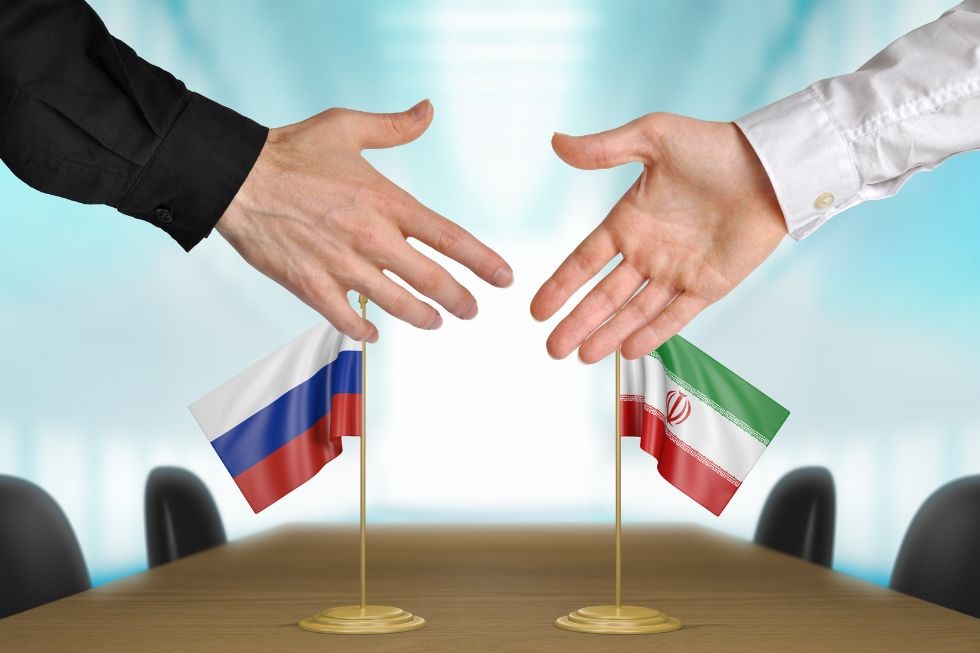
Iran’s newly-minted strategic partnership treaty with Russia may not be more than a bargaining chip if the first five years of Iran’s 25-year, $400 billion cooperation agreement with China are any indication.
The symbolism of the treaty being signed days before United States President Donald Trump was inaugurated was not lost on Iranian and Russian leaders when they signed their 20-year partnership agreement in Moscow this January.
The signing of this long-anticipated agreement comes as Iran reels from 16 months of Middle Eastern conflict, which has reversed the country’s regional fortunes. Iran now braces for what the new Trump administration has in store for the Islamic Republic. It also seeks to revive nuclear talks that would enable the lifting of crippling Western sanctions.

With Trump in the Oval Office once more, the treaty takes on added significance. Iran and Russia are likely to be high on his foreign policy agenda.
International concerns
Trump has promised to end the Ukraine and Gaza wars. In a twist of irony, Iran is the piece of the puzzle that links these two conflicts.
Some speculate that Trump and Russian President Vladimir Putin could sacrifice Ukraine and Iran in a grand bargain. This speculation misses the fact that Iran supporting Russia’s invasion of Ukraine, while backing Hamas against Israel’s assault on Gaza, would be no less hypocritical than the US supporting Ukraine while backing Israel’s devastation of the Palestinian territory. Similarly, double standards are written all over Iran’s application of the treaty’s reference to the principle of territorial integrity to three islands claimed by the United Arab Emirates that it seized in 1971, but not to Russia’s occupation of Ukrainian land.
The strategic partnership treaty’s signing fuels Western and Israeli fears. Many worry that Russia could award Iran for its support in the Ukraine war by supplying it with the technology needed to utilize enriched uranium in a nuclear warhead. Iran has denied Western assertions that the Islamic Republic has supplied Russia with ballistic missiles, drones and ammunition.
Western and Israeli officials are concerned that the treaty could speed up the delivery of Russian Sukhoi SU-35 fighter jets and preparations for the plane’s production in Iran. Further, it could persuade Russia to sell Iran its top-of-the-line S-400 anti-missile air defense system. Russia has so far hesitated to honor Iran’s request for the S-400. It is unclear whether the Asian giant would be more or less willing to give Iran the S-400 after last year, when Israel knocked out the Islamic Republic’s S-300 batteries in one fell swoop.
For their part, Iranian officials worry that Putin could shape Trump’s expected effort to end the Ukraine war by offering to halt Russia’s support for Iran in exchange for US pressure on Ukraine to concede territory and drop its quest for NATO membership.
On a visit to Paris last December, Trump suggested that “Russia and Iran are in a weakened state right now, one because of Ukraine and a bad economy, the other because of Israel and its fighting success. Likewise, Zelenskyy and Ukraine would like to make a deal and stop the madness… There should be an immediate ceasefire, and negotiations should begin.”
Trump was referring to the weakening of Iran’s regional influence. Syria has lost its president, Bashar al-Assad. Israel has destroyed Iranian air defenses. Iran has begun heavily targeting the Lebanese Shiite Muslim militia Hezbollah, a central pillar of the Islamic Republic’s forward defense strategy.
Nuclear deterrents and treaties
Trump has vowed not to allow Iran to develop a nuclear weapon. Israel is lobbying Trump to greenlight Israeli strikes at Iranian nuclear and other facilities, if not launch joint operations together with Israel. The nation argues that Iran is at its most vulnerable because of the destruction of its air defenses and regional geopolitical setbacks.
Additionally, Israel points to US assertions that Iran, since the US withdrawal from the nuclear accord, has reduced from a year to a week or two the time it would need to produce the necessary fissile material for a nuclear weapon.
In 2018, Trump withdrew from the 2015 international agreement that curbed the Islamic Republic’s nuclear programme. In the absence of renewed nuclear talks, Iran has forged closer ties with Russia, China and North Korea. At the very least, the strategic partnership with Russia serves Iran as a hedge in hopes that Trump may couple his sanctions-driven maximum pressure approach with an effort to cut a deal with the Islamic Republic.
What that means in practice is unclear. Iran’s 2021 cooperation agreement with China could have been a game changer by significantly boosting Iran’s regional influence and challenging US policy in the Middle East. The agreement did neither. Instead, it seems to have been put in the deep freeze with officials asserting the agreement constituted a roadmap for specific accords that have yet to be concluded.
Iran’s treaty with Russia, which will need ratification by parliament, could prove to be no different. Even so, Iranian reformists warn that the treaty will deepen Iran’s dependence on Russia and turn the country into a Russian client state.
The treaty’s 40+ articles reportedly cover a wide range of issues, including cybersecurity, nuclear energy, counterterrorism, regional cooperation, money laundering, defense and organized crime. Cooperation on many of these issues will depend on the conclusion of more detailed agreements.
Expanding international networks
Driving closer cooperation is Iran and Russia’s need to circumvent US and European sanctions.
Iranian Central Bank Governor Mohammad Reza Farzin said last November that the two countries had created an interbank network. It would allow them to evade Swift, the US dollar-based financial messaging system that dominates the world’s money and security transfers.
The new system connects the two countries’ networks, allowing Iranians and Russians to make online purchases and withdraw money in each other’s country.
Russia and Iran intend to expand their network to Turkey, Iraq and Afghanistan. That could prove difficult, as neither Turkey nor Iraq is willing to so blatantly violate sanctions imposed on Iran and Russia. Similarly, sanction busting in cooperation with Russia is risky business for Iran as it counts on Britain, France and Germany to help revive indirect talks with the US.
Iran refuses direct talks as long as the US fails to return to the 2015 agreement, which Trump has denounced as the “worst deal ever.”
In anticipation of European criticism of the partnership treaty, Foreign Minister Abbas Araghchi offered to discuss Iranian support for Russia in Ukraine if Europe opens its support of Israel for discussion.
Contradicting Iran’s earlier denials, Araghchi argued, “If Europe is upset about Russia using Iranian weapons, it should also be held accountable for its military cooperation with Israel.”
Source: FairObserver



















